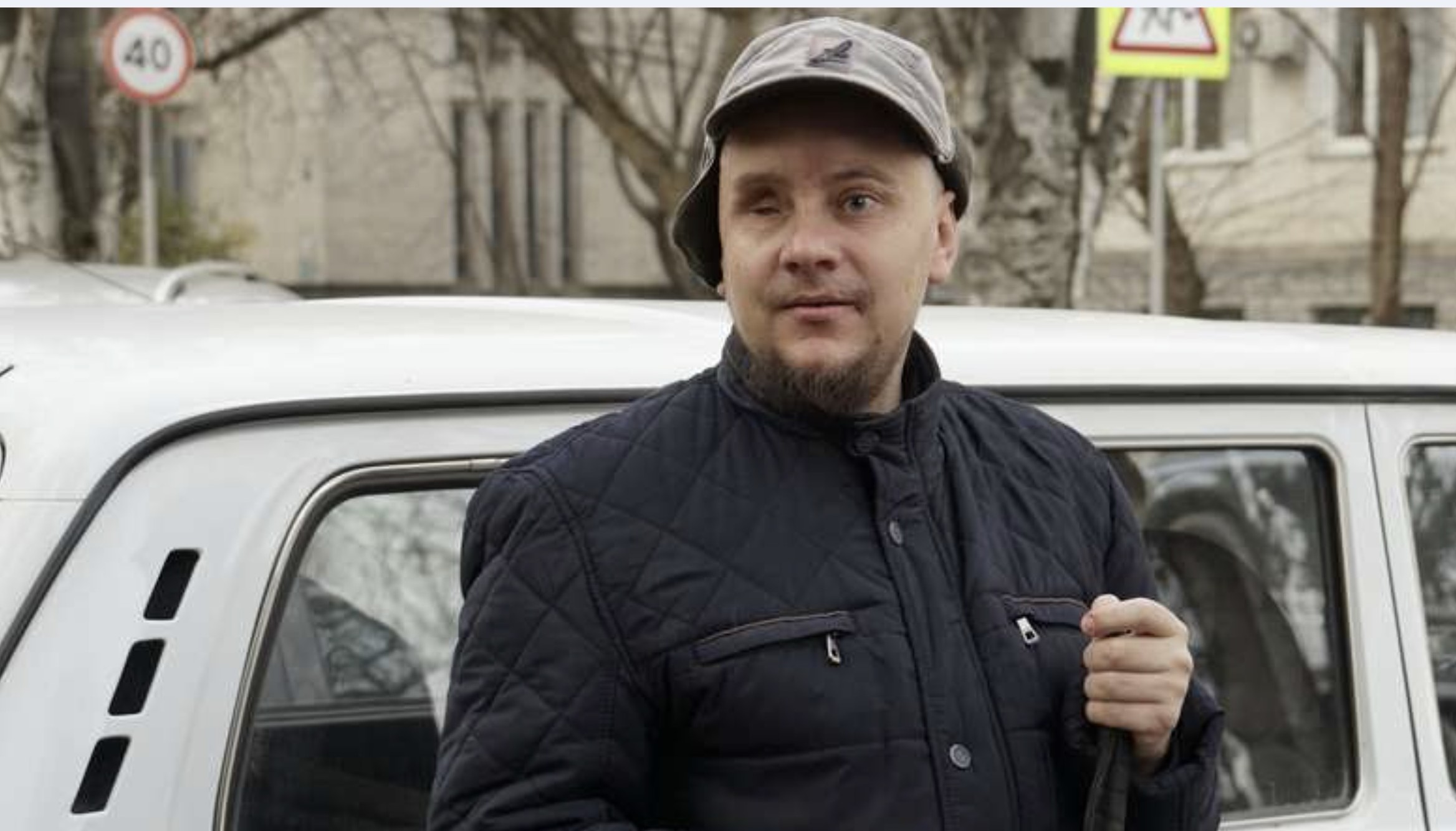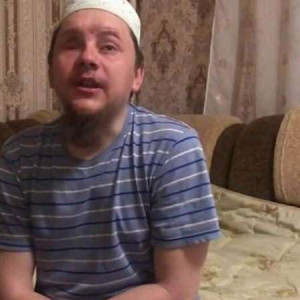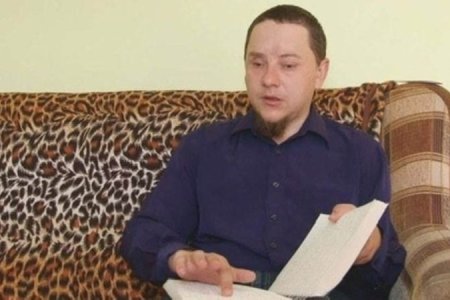
On 31 October 2025, the occupation ‘Crimean high court’ revoked an earlier ruling to jail Oleksandr Sizikov for ten days. The ruling, based on the fact that Sizikov is blind, was startlingly correct, unlike the 10-day sentence issued on 23 October, and the recent Russian appeal court ruling, ordering the rearrest of the blind and disabled Ukrainian political prisoner who was, until May 2025, serving a 17-year sentence on insane charges. Sizikov was not released on 31 October, with his lawyer, Emil Kurbedinov subjected to what he called ‘a cat and mouse game, when he tried to find out where Sizikov was being held. It was only on 2 November that it became clear that, despite the ‘court’ order, Sizikov was being held prisoner in a SIZO [remand prison] in Simferopol.
Occupation police burst into Sizikov’s home during the night from 22 to 23 October 2025. They carried out a ‘search’, removing two laptops and the telephones belonging to Sizikov and his mother, before taking Sizikov away, with no explanation.
The next day, the occupation ‘Bakhchysarai district court’ sentenced Sizikov to ten days’ administrative arrest for supposedly ‘disobeying the police’ (Article 19.3 § 1 of Russia’s code of administrative offences). The charge would be surreal against any person subjected to an armed police raid and search, but the ‘court’ ignored something much more fundamental. Sizikov is totally blind and disabled and was scarcely in a position to show any resistance. His mother was present during the search and could have confirmed Sizikov’s words that he had simply begun collecting his things. She was not allowed to be present, however, when the protocol on these administrative charges were presented to her son, who could not read them as they were not in Braille. Most importantly, blindness is on the official Russian list of conditions which make imprisonment impossible.
Sizikov’s arrest came almost immediately after the Krasnoyarsk regional court on 21 October 2025 allowed an appeal by the Russian prosecutor against a ruling in May by the Minusinsk district court. The latter had, in full accordance with Russian regulations, ordered Sizikov’s release because of his blindness. It had seemed clear, therefore, that the Russian occupation police were hurrying to implement the ruling ordering Sizikov’s rearrest to serve the remainder of his 17-year sentence.
In fact, however, as Kurbedinov pointed out, Sizikov could only, legally, be rearrested once the Russian penal service had received the original of the Krasnoyarsk regional court ruling. No copy of this document had been found during the search in the early hours of 23 October, nor could it have been a mere day after the ruling was announced. This was, doubtless, the reason for the farce with administrative arrest on ‘disobedience’ charges.
Oleksandr Sizikov (b. 1984); Seiran Khairedinov (b. 1988) and Akim Sufianov (b. 1990) were among seven Crimeans arrested after armed ‘searches’ on 7 July 2020. The men were all charged under Russia’s ‘terrorism’ legislation, although they were accused solely of unproven ‘involvement’ in the peaceful transnational Hizb ut-Tahrir Muslim organization which is legal in Ukraine. Russia’s supreme court declared it a ‘terrorist organization’ in 2003, without providing an explanation and having kept it secret until it was too late to lodge an appeal. The FSB in occupied Crimea began arresting Ukrainian citizens, the vast majority of them Crimean Tatars, on these charges in 2015, and has been using them as a weapon against civic journalists and activists, especially those involved in the Crimean Solidarity human rights movement ever since. The same is true here, with all three men having spoken out in defence of victims of Russian repression. Despite his disability, Sizikov had held several single-person pickets, protesting against the mounting repression in occupied Crimea, especially that against Crimean Muslims. Khairedinov and Sufianov had also actively supported political prisoners and their families. The two younger men have been imprisoned since 7 July 2020. Sufianov, who was 30 when arrested, had only recently married. Khairedinov, who is four years older, has three children: Emil; Elvina and Yasmina, who was only a year old when her father was arrested.
Emil Kurbedinov suggested in October 2020 that Sizikov’s arrest was the FSB’s revenge for many occasions when Sizikov had expressed his outrage at the armed searches they were carrying out and the political trials underway. “There is no other way to explain the persecution of a totally blind person who has not committed any crime”.
The case was especially shocking as Russia’s FSB had not only targeted a person who was blind and restricted in his movements for its conveyor-belt prosecutions which carry guaranteed huge sentences, but even designated Sizikov as ‘organizer’. In all of its ‘Hizb ut-Tahrir trials’, the FSB charge one or more defendants with ‘organizing’ an entirely unproven ‘Hizb ut-Tahrir group’ under Article 205.5 § 1 of Russia’s criminal code), with this carrying a sentence, at present, of between 17 and 20 years. The others are accused of ‘involvement’ under Article 205.5 § 2, with sentences, typically, of between 12 and 16 years.
It should be stressed that the defendants in these ‘trials’ are never accused of anything even remotely resembling terrorist activities. Sizikov, for example, was claimed by the prosecution to have organized a group which “carried out covert anti-constitutional activities through exerting influence on people’s religious feelings; organized and carried out meetings of the group, so-called ‘khalakaty’; looked for new participants and circulated the ideas”.
Although the charges are under Russia’s ‘terrorism legislation’, the FSB never make any pretence of looking for anything but ‘prohibited religious literature’ during their armed searches. On most occasions, they bring such literature which they then claim to have found in places where no devout Muslim would keep religious books. It was clear on the day of these alleged ‘searches’ that such material had been planted in Khairedinov and Sufianov’s homes. It was only later, during the ‘trial’, that it became clear that the FSB had also planted books in Sizikov’s home – books that were not in Braille and which he could not possibly have read since the catastrophic bike accident that left him blind and with grave medical conditions back in 2009.
The other ‘evidence’ in the case was just as flawed, with the same ‘secret witnesses’ used here as in numerous other political trials of men from Bakhchysarai. Neither Sizikov’s disabilities, nor the lack of any justification for such charges against men who were not accused of any identifiable crime, made any difference to two Russian courts. On 17 May 2023, ‘judges’ Kirill Krivtsov (presiding), together with Alexei Magomadov and Sergei Yarosh from the Southern District Military Court in Rostov found all three men ‘guilty’ both of the charges under Article 205.5 and of the charge of ‘planning to violently seize power’. Sizikov was sentenced to 17 years, Khairedinov and Sufianov to 12 years’, with subsequent periods of 18 months and 12 months, respectively, of restricted liberty. The sentences were for maximum-security penal institutions, with the first four years in the harshest of these, a prison.
All of these sentences against innocent men were upheld by the Vlasikha military court of appeal on 13 September 2024.
Oleksandr Sizikov is one of two Crimean political prisoners whose legal release due to grave health conditions was challenged by the Russian prosecutor and overturned. See also:



